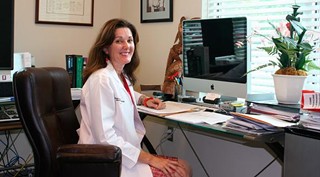Need to see a doctor? Get in line.
While the Affordable Care Act will increase health insurance for over 300,000 citizens by 2014, it won’t provide more practitioners—leaving a scary gap between coverage and care. Some estimate that America’s doctor shortage will run a deficit of 63,000 by 2015 and 100,000 by 2025, which translates to longer waits for appointments and even shorter time with overworked doctors.
Dr. Lora Denton might have part of the cure. The internist at Memorial Health Medical University is exploring the idea of job sharing to make the medical profession—known for its brutal hours—more inviting to those seeking a more balanced lifestyle. As the mother of two married to a surgeon, Dr. Denton knows a little something about juggling a medical career with family.
The Waycross native was recently awarded an American Medical Association Foundation grant for her research proposal Flexible Work Options: Finding Feasible Solutions to Keep Women in the Workplace. Only five Joan F. Giambalvo Scholarships were awarded in 2012 to “advance the progress of women in the medical profession”; other recipients include doctors from Yale and the University of Michigan.
We caught up with the good doctor in between patients at the Center for Internal Medicine on Waters Avenue.
Why focus on women in the medical workforce?
We’re about to have more patients able to see a doctor than ever before with the Affordable Health Care Act, and we need more physicians than we’ve ever needed. It’s a huge issue.
Fifty percent of medical school matriculants are women, but only 25 percent of practicing physicians are women. So there’s a huge disconnect with women actually being able to stay in the workforce, and I’m trying to identify what it is. Maybe it’s motherhood, maybe they just want to have a life.
Job sharing is already well–documented and well–done in big corporations. It’s just a matter of getting it into the medical field. It makes sense to introduce it into the traditional hospital settings.
What does a job share look like for a doctor?
A job share means more than part–time work for a physician. It means there’s always someone there to care for the patients.
Let’s say we had a total of 50 hours in a job. You’d work Monday, Tuesday, Wednesday; I’d work Wednesday, Thursday, Friday. We’d have one communication day. You’d have your patients, and the days you weren’t there, or if one of them got sick, they’d see your partner. So you work like one person.
So the doctors sharing the job obviously have to have good communication.
It’s almost like a marriage [laughs]. That’s one of the issues; you have to pick a suitable partner.
How is that different than just being in the same medical practice?
Well, this way, you don’t have to put upon on your partners. You take the regular workweek of one physician and plug in two physicians. What happens in the end is you get more work and have happier employees. And overhead goes down because people work more efficiently.
Job sharing has been studied a lot in corporations and it works: Productivity increases. Job satisfaction increases.
And you don’t have to recruit new people all the time, which can cost hundreds of thousands of dollars.
There’s evidence that jobsharing works in the business sector and in private medical practice. But what about a hospital setting?
The biggest issue is administrators. They don’t want part–time workers.
Well, the way I see it is you’re about to have the Affordable Health Care Act go into effect, and you’re going to need more physicians than we actually have in the country right now. And you’re not going to be flexible?
The administrators who are going to be flexible and who are going to offer job sharing are going to be the ones on the forefront. They’re going to be the ones hiring the best people. People will relocate for a better lifestyle.
The medical lifestyle is traditionally pretty stressful. Do you think working less makes a better doctor?
I think working less makes a happier doctor. And studies show it makes a more productive doctor.
The Atlantic recently ran a controversial article about women in the workforce that argued, “No, women can’t have it all.”
Can job sharing help women achieve work–life balance?
I think it can. MomMD, an online community, recently did a survey of women physicians, medical students and residents. Sixty percent said they would job share if given the opportunity. But the opportunities aren’t there.
Would this option be marketed to male doctors?
Absolutely. It’s as much in demand for men, too. Everybody wants a life. You should be able to have a family, a career and time for community service.
Did you become interested in job sharing when you became a parent?
I actually job shared before I had children, after my residency in Atlanta, because I wanted to travel. When I first brought the idea to my boss, she said, “Absolutely not.” But then this other person and I wrote a proposal and she said, “I guess you can try it and see how it works.” Now everyone in that office job shares.
What’s the nitty gritty of your research?
Because this grant was given by the AMA, I can use the AMA database. I initially was going to send out a checkbox survey, but then I decided that actual stories and comments from women about their personal situations would be better. Eighteen percent of women in medicine do job share, so there should be some out there who can give us some good feedback.
When you’re trying to design something that you hope will pioneer a new way and get more people in the workforce, getting evidence of what people perceive as their barriers will help us forge ahead.
I also added in questions about salary. Not because I think it’s all that relevant, but I’m interested in determining if there’s any evidence that salary drives work for women, to see if women would take less money for increased flexibility.
So this grant is going to help identify the barriers and design a better system.
Yes. Before I applied for the grant, I looked online at all the big recruitment sites for physicians and looked for job shares. I got ZERO response. Even on MomMD, there would only be one, and it would be for a nephrologist or some other specialty.
But the data is out there: Women want to job share, they just don’t know how.
We’re encouraging girls to go into medicine and other science–based fields, but also to value work–life balance. This is about more opportunities for both.
Exactly. We have to think of ways to make this plausible and feasible.
I now work full–time, but my hours are flexible. My husband and I try to toggle the children, and we manage. We both had to cut back our hours and we work it out.
You make it work for your family. If other physicians felt like they had the freedom to that, they would.


























